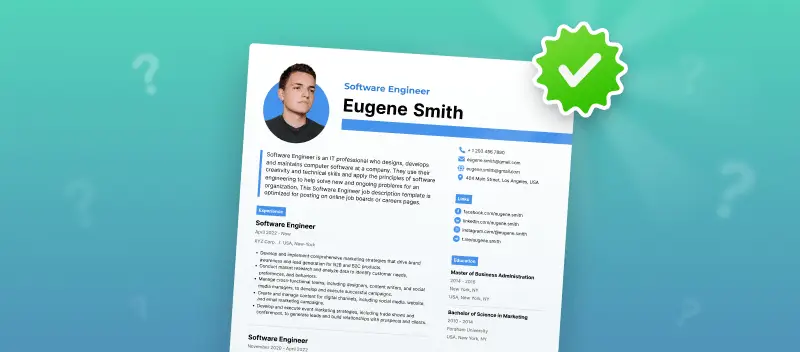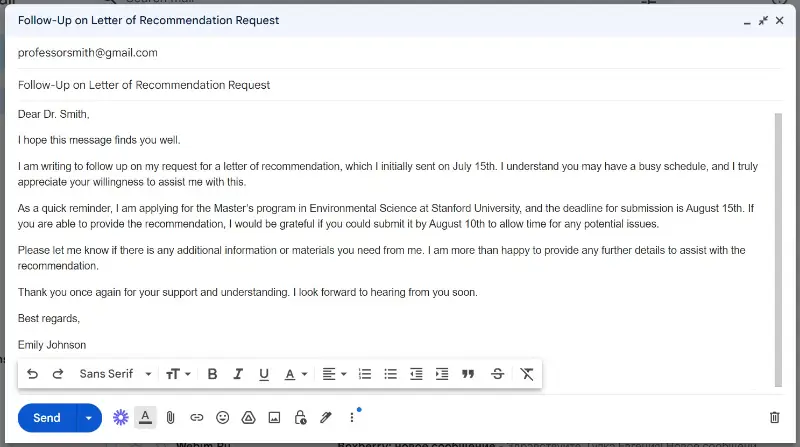Deciding to leave your job is never easy, and one of the most challenging aspects can be figuring out how to tell your boss you’re quitting.
Whether you're moving on to a new opportunity, pursuing personal goals, or seeking a better fit, approaching this conversation with professionalism and tact is crucial.
In this article, we’ll explore effective strategies for how to tell your boss you're leaving. We will offer practical tips on timing, communication, and maintaining a positive relationship as you transition out of your role.
How to tell your boss you're quitting?
Before you even think about approaching your boss, ensure that your decision to resign is well-considered. Reflect on your reasons for leaving a job and review any terms in your employment contract.
Key details to pay attention to:
- Notice period. Your contract should specify the length of the notice period (e.g., 2 week notice letter, one month). Make sure you adhere to this requirement to avoid any potential issues.
- Resignation procedure. This might include submitting a formal letter, notifying certain individuals, or using a particular process for your resignation.
- Final pay. This should include payment for any unused vacation or sick days, as well as any other outstanding compensation.
- Company property. Review any clauses related to the return of company property, such as laptops, phones, or other equipment.
- Non-compete clauses. These might restrict your ability to work for competitors or share proprietary information.
- Non-disclosure agreements. If you have signed an NDA, ensure you understand the ongoing obligations related to confidentiality.
- Benefits termination. Check when your health insurance and other benefits will end, and whether you have options like COBRA or plan rollovers.
- Exit interview. Understand if you are required to participate in it and prepare to provide constructive feedback.
- When to tell your boss you're leaving?
Timing is crucial when delivering significant news.
Request a meeting with your boss at a time when they’re not overwhelmed or stressed.
Ideally, this should be an in-person meeting, but if you’re working remotely, a video call is an appropriate alternative. Avoid casual settings or times when your boss is likely to be distracted.
- How to start resignation conversation?
When the meeting begins, start by expressing gratitude. Acknowledge the opportunities and support you’ve received.
For instance, you might say, "I want to thank you for the valuable experiences and support you’ve provided me during my tenure here." This sets a positive tone for the conversation.
Transition into the core of your message clearly and concisely. You could say something like, "After careful consideration, I have decided to resign from my position." Clearly stating your intention helps prevent any misunderstandings.
- What to say when resigning?
Adhere to the notice period outlined in your employment contract, which is often two weeks but can vary. Make it clear when your last working day will be.
For example, "In accordance with my contract, I am providing a two-week notice. My last day will be [specific date]." This demonstrates your commitment to a smooth transition.
Offer to assist during this period. Express your willingness to help with training your replacement or transferring responsibilities. This gesture shows your professionalism and consideration for the team’s continuity.
Your boss might have questions or express surprise, and in some cases, they might attempt to negotiate your decision. Be prepared to answer their questions succinctly or to politely decline to go into details if you prefer.
Regardless of their reaction, maintain a calm and professional demeanor throughout the conversation.
What to say when resigning verbally samples
Below are some examples of how to tell manager you're leaving for different reasons. You can adjust the specifics to fit your situation.
General sample of how to resign in person:
Hi Sarah, I hope you’re doing well. I wanted to discuss something important with you. After careful consideration, I’ve decided to resign from my position at GreenTech Innovations. My last working day will be August 16th.
This decision wasn’t easy for me, as I’ve enjoyed working with this team and contributing to our projects. I’m truly grateful for the opportunities and support I’ve received here.
I’m committed to ensuring a smooth transition. Please let me know how I can assist with handing over my responsibilities and any ongoing projects.
How to tell your employer you are leaving because of a new opportunity:
Hello James, I hope you’re having a good day. I wanted to let you know that I’ve recently accepted a new position at Innovate Corp, which aligns closely with my career goals. As a result, I need to resign from my role at GreenTech Innovations.
My final working day will be August 16th. I’ve really enjoyed my time here and appreciate all the support and guidance you and the team have provided.
I’m eager to help with the transition, whether it’s completing current projects, documenting procedures, or training a replacement. Please let me know how best I can assist during this period.
What to say when quitting a job for personal reasons:
Hello Michael, I hope you’re doing well. I need to share that I’m resigning from my position at GreenTech Innovations due to personal reasons that require my immediate and ongoing attention. My last day will be August 16th.
This was a tough decision for me because I’ve genuinely enjoyed working here and being part of this team. I’m committed to ensuring that my departure causes minimal disruption. I’m happy to assist in any way I can, whether that’s wrapping up current tasks or helping with the transition process.
Thank you for your understanding and support during this time.
How to tell your boss you're quitting because of relocation:
Hi Jessica, I hope everything is going well. I wanted to let you know that I’ve decided to resign from my job at GreenTech Innovations because I’m relocating to Seattle, Washington. My final working day will be August 16th.
This move is a significant change for me. While I’m excited about the new chapter, I’m also sad to leave such a fantastic team and workplace.
I’m committed to ensuring a smooth transition and would be happy to help with any tasks or training required to hand over my responsibilities. Please let me know how I can assist during this time.
What to say when quitting a job due to health issues:
Hello David, I hope you’re doing well. I need to inform you that I have to resign from my position at GreenTech Innovations due to my health issues. My last working day will be August 16th.
This decision is difficult for me, as I’ve greatly valued my time here and the opportunities I’ve had to contribute to the team. I appreciate the understanding and support you’ve shown me. I’m committed to making the transition as smooth as possible, including completing any outstanding work and helping with the handover of my duties.
Please let me know how I can best support the team during this period.
How to tell manager you're leaving to pursue higher education:
Hello Alex, I hope you’re well. I’m reaching out to inform you that I’ve decided to resign from my position at GreenTech Innovations. I’ll be pursuing higher education starting next semester. My last working day will be August 16th.
This opportunity to further my studies is something I’m very excited about. However, it also means I need to step away from my current role. I’ve greatly valued my time here and the support I’ve received.
I’m happy to help with any transition tasks, including handing over my responsibilities and training a successor. Please let me know how I can be of assistance during this period.
What to say when quitting a job due to unresolved conflicts:
Hello Brian, I hope you’re well. I wanted to let you know that I’ve decided to quit from my position at GreenTech Innovations. After trying to address some ongoing conflicts and challenges in the workplace, I’ve concluded that it’s best for me to move on.
My last day will be August 16th. I’ve appreciated the opportunities I’ve had here and have tried my best to work through these issues.
I’m committed to ensuring a smooth handover of my responsibilities. I am available to assist in any way to facilitate a smooth transition for the team.
How to tell your boss you're leaving because of the job role change:
Hi Emily, I hope you’re doing well. I wanted to discuss my resignation from my position at GreenTech Innovations. I’ve been offered a role that is a better fit for my skill set and career goals, so my last working day will be August 16th.
While I’m excited about this new opportunity, I’ve genuinely enjoyed working with you and the team.
I’m dedicated to making the transition as smooth as possible and am available to help with training a replacement and transferring my responsibilities. Please let me know how I can assist during this time.
How to tell your manager you’re leaving due to seeking better work-life balance:
Hi Laura, I hope you’re doing well. I wanted to let you know that after careful consideration, I’ve decided to resign from my position at GreenTech Innovations to focus on achieving a better work-life balance. My last day will be August 16th.
I’ve truly valued my time here and appreciate all the support from you and the team. I’m committed to assisting with the transition to ensure everything continues smoothly.
Please let me know how I can best help during this period.
Telling your boss you quit in a resignation letter
After your conversation, formalize your decision in writing.
A resignation letter is a formal document that an employee submits to their employer to officially announce their decision to leave their position.
It typically includes the following elements:
- Date. The date the letter is written.
- Recipient's information. The name and title of the person to whom the letter is addressed, usually the employee’s supervisor or HR representative.
- Salutation. A formal greeting, such as "Dear [Supervisor’s Name]".
- Statement of resignation. A clear and concise statement of resignation, including the position being resigned from.
- Notice period. Information about the last working day, adhering to the notice period required by the company’s policy or contract.
- Expression of gratitude. A brief sentence of appreciation for the opportunities and experiences gained while working at the company.
- Offer of assistance. An offer to help with the transition, such as training a replacement or handing over responsibilities.
- Closing. A formal conclusion, such as "Sincerely" or "Best regards", followed by the employee’s name.
- Attachments. If required, mention any enclosed items such as exit forms or asset return confirmations.
- Contact information. Include your phone number and email for any follow-up communication after your departure.
Here’s a sample resignation letter you can use as an inspiration:
Cultural considerations
Resigning from a job is a universal professional milestone, but how it is approached differs significantly across countries and cultures. These differences reflect varying attitudes towards work, hierarchy, and etiquette.
Notice period
In many countries, the notice period is a critical aspect of resignation etiquette.
- United States: Two weeks' is standard, but at-will employment laws mean employees can technically leave immediately.
- United Kingdom: Defined in employment contracts and range from one to three months.
- Germany: Regulated by law, with a minimum of four weeks, but this extends based on seniority and tenure.
- Japan: Emphasizes formal, face-to-face meetings and submission of a written resignation letter well in advance, often with several months' notice.
Cultural sensitivity
The approach to resignation also reflects the cultural emphasis on relationships and respect for authority.
- Japan: Workers often provide extended notice to allow for a smooth transition and to show respect for their employers. Resignations are typically formal, often accompanied by a written letter.
- India: Notice periods can extend up to three months, especially in the IT sector. Employees often maintain professionalism to preserve references and future opportunities.
- Nordic Countries: Open and direct communication is encouraged. Resignation discussions are often informal but considerate of both employer and employee needs.
Professional norms
Social norms around resignation also differ.
- China: A formal letter is customary, and employees often strive to maintain harmony with employers and coworkers.
- Australia: Informal discussions often precede written notice, emphasizing transparency and fairness.
FAQ on how to tell your boss you're leaving
- How do I handle a counteroffer?
- If your boss makes a counteroffer, be honest about your reasons for leaving and consider whether those issues have been addressed. If not, politely decline the offer and stick to your decision.
- What if my boss reacts negatively?
- Stay calm and professional. Acknowledge their reaction, and reinforce your reasons for leaving if necessary. Keep the conversation focused on your departure and future plans.
- Is it appropriate to discuss my new job?
- It’s fine to share general information about your new role, but avoid going into too much detail or speaking negatively about your current position.
- How do I handle projects or responsibilities before I leave?
- Prioritize completing ongoing projects or tasks by setting clear deadlines and clearly communicating your progress to your team. Document key processes and provide detailed handover notes to ensure a smooth transition for your successor.
- Should I tell my colleagues before telling my boss?
- No, it’s best to inform your employer first before sharing the news with colleagues. This shows respect for your boss and avoids any potential misunderstandings.
- What if I’m leaving on bad terms?
- Avoid burning bridges as you never know when you might cross paths with your boss or colleagues again.
- What if my boss asks me to stay longer?
- If you’re unable to extend your notice period, politely explain that your new job starts on a specific date and that you’ve already committed to that timeline.
- Can I use my remaining vacation days during the notice period?
- This depends on company policy. Some employers allow it, while others may prefer you work through the entire notice. Clarify with HR early in the process.
Conclusion
In conclusion, knowing what to say when quitting a job is essential for leaving your work on a positive note and preserving professional relationships.
By approaching the conversation with clarity, respect, and a well-considered resignation letter, you can navigate this transition smoothly.
Remember, how you exit can impact future opportunities and your professional reputation, so make every effort to handle your departure gracefully.




